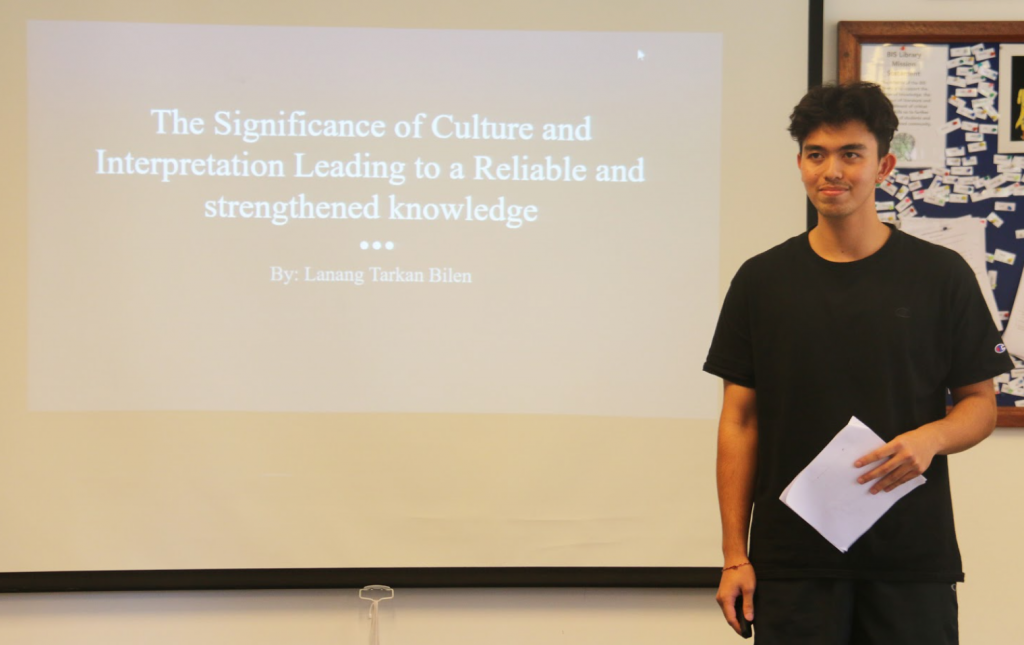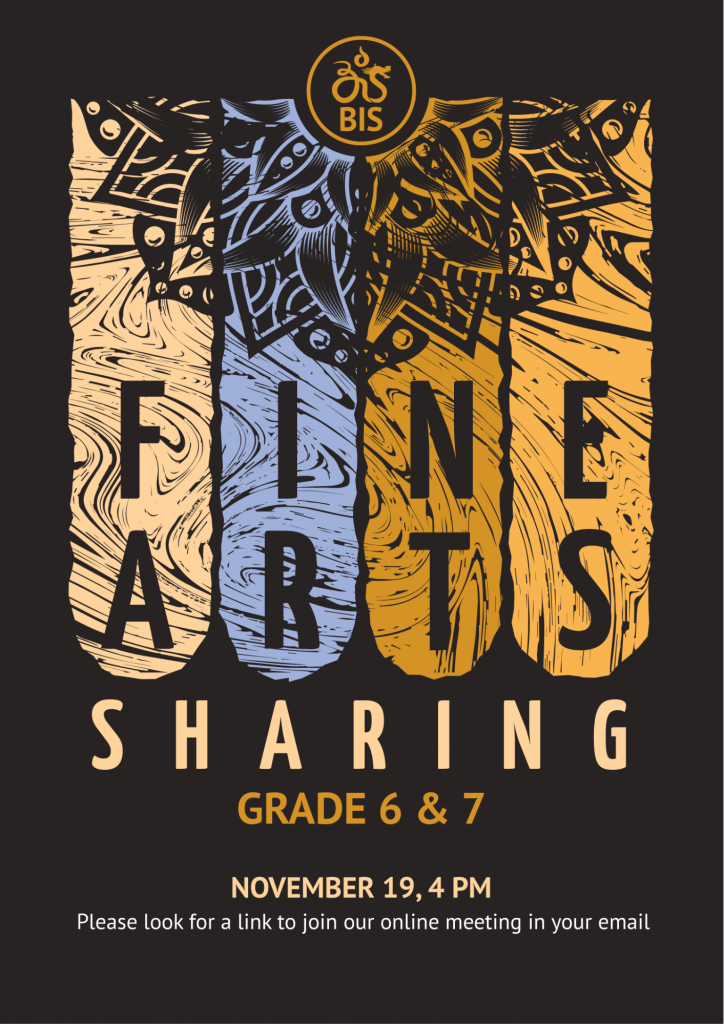Secondary Newsletter 13 – November 13, 2020
Counseling
University Counseling
CAS Corner by Malaika Wauters
Grade 12 TOK Presentations
Grade 6 & 7 Fine Arts Sharing
Counseling
As a parent, how do you show your teens you still care and want to be engaged in their lives? Teens send mixed messages of wanting to be independent but needing you a great deal. I run Positive Discipline for parents and hope to offer this soon to all of you. In this parenting way, the big idea is that you learn the importance of being kind and firm, not permissive, authoritarian, or neglectful. One of the tools that parents tell me truly changes how their family engages is having weekly family meetings. Family meetings are a sacred family time that does not get altered due to work, homework, etc. Even if one family member is out of the country, that member shows commitment and joins (virtually). Family meetings teach teens about the social and life skills they will need as they leave home and go out into the world independently. They give everyone in the family a voice.
How do you choose the day and time? Decide when you usually get together, like after a Saturday breakfast or Wednesday night dinner. Have a whiteboard or paper on the refrigerator where family members can write issues to solve during the family meeting. Ex- I don’t like that you shut the internet off for me at 8:30 pm.
What’s the format?
- Compliments and appreciations- Everyone should share. If you have a real talker in the family, you can use a timer and pass around an item, like a pet rock, where only the person with the pet rock can talk.
- Evaluation of past solutions– Is the solution we are trying from a past problem working for us? Ex- I know we agreed that I would use an alarm, but it’s not working for me. What else can I try?
- Agenda items – Each person can choose to:
- Share feelings (It’s helpful to have a feelings wheel.)
- Invite a discussion (Share a fascinating fact, current event, or something that happened at work/school.)
- Brainstorm for solutions (Together, the family selects a problem from their list, and every one offers possible solutions. The family decides on a solution to try for a set time.)
- Calendar events, meal planning- This is a time to get the next week planned and divide the tasks. Teens should be learning to do laundry, make their lunch, cook basic meals, and run errands. Make sure they are prepared to enter the real world.
- Fun activity and dessert- The dessert is optional, but you should end with a fun board or card game, take a walk together, or do something that everyone enjoys.
Most importantly, if you tell your teens you are making this a committed family time each week, devices should not be visible. Family meetings are more than having a meal together. Everyone learns to present their issues, problem solve, give input for the upcoming week, and continue labeling their feelings. Family meetings build connections and empathy.
University Counseling
BridgeU has posted videos from their University Fair. The videos are by region and are incredibly informative.
BridgeU has hosted virtual talks with representatives from various countries sharing information about applying, life at the university, cost, and much more.
If you are interested in learning about the University of Liverpool, Queen Mary University of London, SOAS Uni of London, UWE Bristol, Uni of Nottingham, or Uni of Plymouth, watch this video.
If you are interested in learning about Jacobs University (Germany), IE Uni (Spain), Bocconi University (Italy), or EHL (Switzerland), watch this video.
CAS Corner by Malaika Wauters
Distributing Food Packages Around Nusa Lembongan
Learning outcomes:
- Recognize and consider the ethics of choices and actions
- Demonstrate engagement in issues of global significance
- Demonstrate how to initiate and plan a CAS experience
- Identify strengths and develop areas for growth
Reflection:
We drove around the Nusa Lembongan Island with a buggy at around 11 am to distribute the food packages or “paket sambako” that we previously prepared. As we drove along we came across many struggling families that we happily gave packages too, we also got the opportunity to give them masks and help their young children put on the masks. I really enjoyed conversing with these people and listening to them express their gratitude for our initiatives, I was able to get a good understanding of their situation and how difficult their struggle has been during this pandemic, it felt really rewarding to see how much for a difference we made with this simple act. I especially enjoyed seeing the happiness and excitement in the children, they jumped around in their new masks and had such great smiles, it was so heartwarming to experience.
All the families and people we were able to help mentioned that they were especially grateful to receive these packages during the pandemic because all of their businesses were failing due to the complete lack of tourists on the island, as well as the lack of support from the main Bali island. I’m especially grateful that we were able to personally distribute these packages because the interaction and conversations with these people were so meaningful and because of the personal experience we were able to make a real connection with these locals.
Overall, our preparation and planning paid off, the experience went smoothly and we didn’t have to adjust anything, continuing, I’m glad we took the opportunity to take initiative and give back to the community. Although, I recognize that using plastic bags for the packages will contribute to the plastic pollution in Bali and Nusa Lembongan, we didn’t have any other eco-friendly options but I can confirm that our actions had completely ethical intentions, in the future I would prepare biodegradable cassava bags. This experience has allowed me to demonstrate my engagement with issues of global importance such as poverty and world hunger. Although we were only able to help some of the locals in Nusa Lembongan, small differences regarding global issues are still differences, I’m glad we were able to make a difference for these families.
Grade 12 TOK Presentations

Monday, November 16 will see the Grade 12 students give their TOK presentation in the library.
The TOK presentation counts for 33% of a student’s final grade in TOK. Coupled with a good grade in their EE students can gain as many as 3 additional points for their final Diploma score.
Students give a presentation about a Knowledge Question [KQ] that is related to a Real Life Situation [RLS]. For example, from the Qanon conspiracy theories [RLS] students formulated the KQ: To what extent is technology leading towards creating a divided society?
For any parents who would like to and are able to watch the presentations live please send an email to dpcoordinator@baliis.net and he will add you to the Google Meet invite. For any parents who can not watch the presentations live, please send an email to the same address and the DPC will share the recorded video with you. Due to the location of the presentations and the limited capacity in following our health and safety policies, we will not invite parents into this event. Thank you for your understanding.
Grade 6 & 7 Fine Arts Sharing

Students will shortly enter their final week of the first rotation of the Arts (Music, Art, and Drama).
To celebrate we will hold an Arts Sharing event online on Thursday, November 19, at 4 pm with Zoom.
Be sure to tune in as the students have produced some outstanding work and we would like to enjoy and acknowledge their outstanding achievements.
The link for the event will be shared 24 hours prior to the event so please check your email and contact me if there are any issues finding it. (eandrews@baliis.net)
We look forward to spending the afternoon celebrating Grade 6 & 7 achievements in the Arts with the BIS Community.
Secondary Arts: Edward Andrews, Hayley Green, Ina Wiweka



